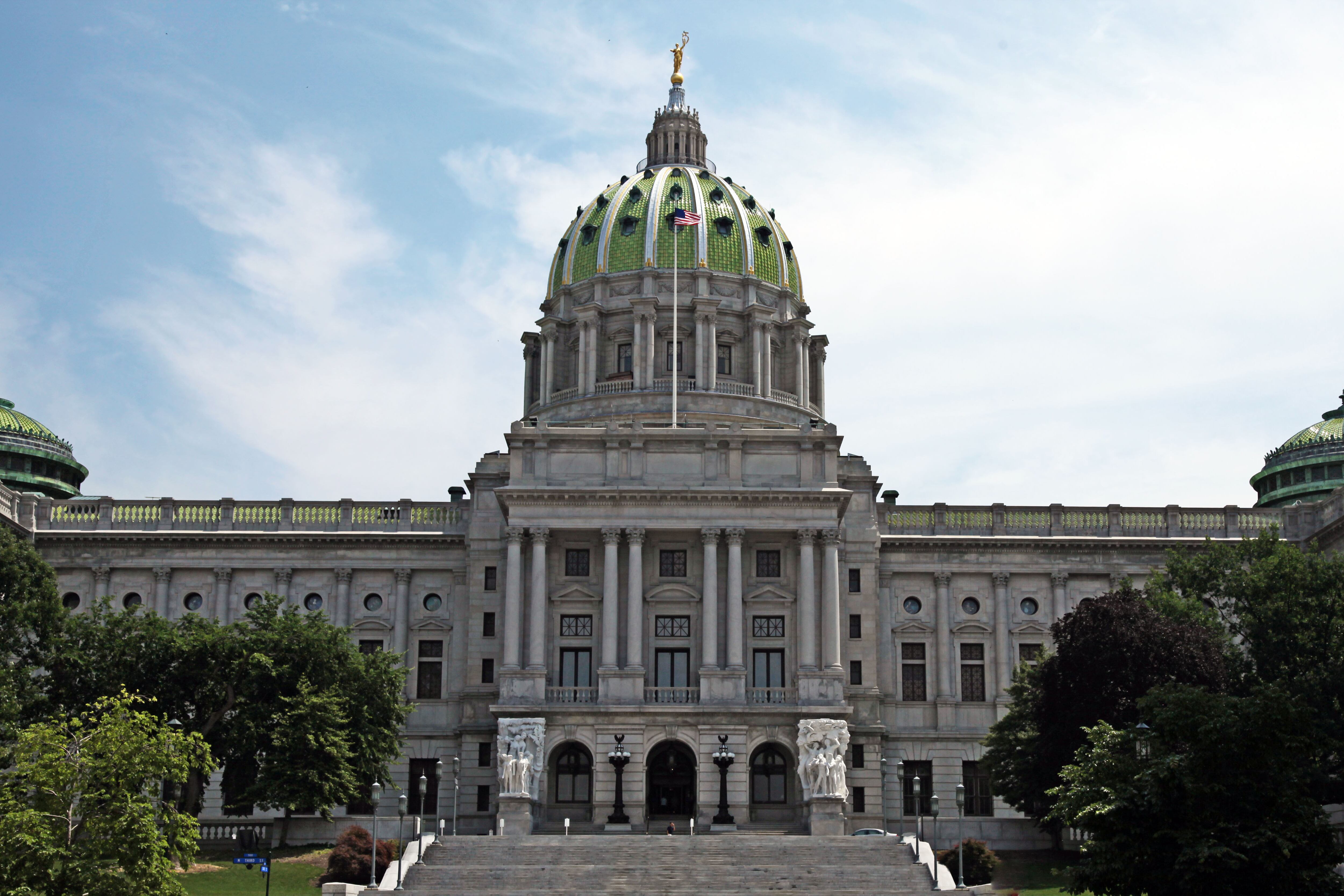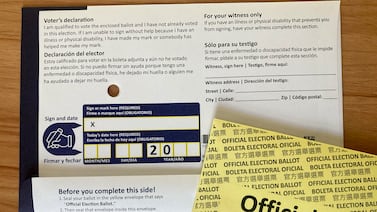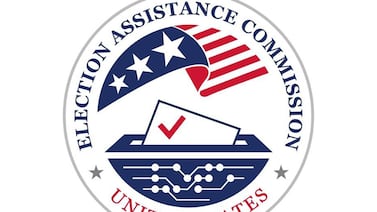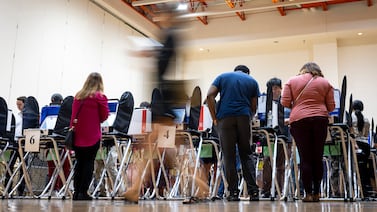Votebeat is a nonprofit news organization reporting on voting access and election administration across the U.S. Sign up for our free newsletters here.
The Pennsylvania House has advanced a bill to change the date of the 2024 presidential primary while rejecting an effort to implement expanded voter ID requirements, mail ballot rule changes, and a slew of other provisions.
In a contentious session Thursday that included singing, yelling, and arguments over the events of Jan. 6, the state House passed a bill along party lines that would move the date of the 2024 presidential primary from April 23 to April 2.
A second bill to move the primary to March 19 — previously approved by the state Senate — failed with a wide margin of bipartisan opposition. By the time of the vote, that bill had morphed into an omnibus election reform package.
“This bill should have been in the Senate by June,” state Rep. Seth Grove (R., York) said of the legislation to move the primary to April 2, capturing the sentiment of many Republican legislators and county leaders.
In a statement, state Senate Majority Leader Joe Pittman (R., Indiana) did not directly address whether leadership will bring the April 2 measure up for a vote. The chamber had opted for March 19 as the date for the primary when it passed a bill last month.
“We have tried to advance a new primary date out of respect for the Jewish holiday,” the statement said. “Those efforts have clearly not been successful and the window to make any change is rapidly closing given the House actions this week.”
State Senate leaders have yet to publicly comment on whether they will bring the April 2 proposal up for a vote. The chamber had opted for March 19 as the date for the primary when it passed a bill last month.
The current date of the 2024 primary, April 23, conflicts with the Jewish holiday of Passover and places the swing state late in the primary cycle. While the effort to move the primary has received bipartisan, bicameral, and gubernatorial support, counties, school boards, and a legislative advisory board are concerned it will strain local election offices, especially if lawmakers drag the decision out.
There are only 180 days until April 2, 2024.
“The hour is late, and counties have already made a lot of decisions,” state Rep. Russ Diamond (R., Lebanon) said Thursday.
The Election Law Advisory Board — a joint commission of the Legislature whose members include representatives from both chambers, counties, and the Department of State — agreed.
In a letter obtained by Votebeat and Spotlight PA last week, the board said it had “reservations” about the effort to move the primary and that any such change should be made “at least a year before the election.”
County officials are primarily concerned that changing the date on such short notice will make it difficult to secure polling places and workers to staff those locations.
“The big thing we heard about today is absolutely, probably the biggest factor … the polling locations and the poll workers,” Snyder County Commissioner Joe Kantz, who sits on the board, told Votebeat and Spotlight PA after a meeting of the board last month.
Many usual poll workers may have made other plans, given the short notice. Polling locations are also typically notified of election dates a year or more in advance.
More time is also needed to prepare now than in the past due to Pennsylvania’s still relatively new no-excuse mail balloting law.
“Our calendars have gotten a lot bigger,” Kantz said. “So if we move the primary ahead, that’s going to condense that that much more. … The Legislature is going to do what they want to do, and so whatever they do, as counties always do, we’ll find a way to make it work, but it’s going to be painful.”
The three other states that had primaries scheduled for April 23 have already moved their dates.
Schools would be strongly affected in the event of a primary date change. School boards are required to allow their facilities to be used as polling places if requested. Already, they’ve set their calendars for an April 23 primary.
“If the primary election day is changed at this point, when school calendars have already been established, the change could close schools and interrupt student learning,” said Mackenzie Christiana, senior manager of communications of the Pennsylvania School Boards Association.
State law also ties school boards’ timeline to set their budgets to the primary election. An earlier primary, Christiana said, requires districts to “build their preliminary budgets just months into their new fiscal year.”
A bipartisan rejection
The March 19 bill, which passed the state Senate 45-2 last month, failed 26-177 in the state House midday Thursday, supported only by a handful of suburban Democrats.
State House lawmakers added three amendments to the measure Wednesday which substantially altered it.
Those amendments added new voter ID requirements and allowed for the processing of mail ballots ahead of Election Day, which is known as pre-canvassing. The amendments also removed dating requirements for mail ballots and updated the requirements to request election recounts, among other changes.
While counties have been strongly in favor of some of these changes — particularly pre-canvassing — the rapid introduction of the policies, coupled with logistical concerns moving the primary creates, caught them off-guard.
“If the Legislature wants to change the primary date, we suggest they focus on getting that bill to the governor’s desk, and not further delay action by adding unrelated amendments,” John Buffone, a spokesperson for the County Commissioners Association of Pennsylvania, said this week. “We have also asked that counties be included when election legislation is drafted to make sure the language can be successfully implemented, and we are significantly concerned about making other changes without appropriate time to fully review.”
Lisa Deeley, a Democratic city commissioner from Philadelphia, echoed that sentiment Wednesday.
“The amendment is well-meaning but not well written,” Deeley said in a statement, referring to the amendment that added pre-canvassing and other items to the March 19 bill. “It gives election officials very little and adds a ton of extra work [to] our plate. I urge everyone to vote against it. Opportunities to improve the Election Code come around so infrequently that we cannot keep making it worse.”
The bill’s politics are complicated. An amendment to require voters to show a photo ID every time they vote in person passed with support from every member of the Republican minority and 22 Democrats.
Expanding the state’s voter ID requirements is a Republican priority, and GOP lawmakers who control the state Senate have made it clear that they want it addressed alongside other election changes.
The language considered by the state House this week was authored by moderate state Rep. Tom Mehaffie (R., Dauphin). He told Votebeat and Spotlight PA he bounced the language off both Democratic Gov. Josh Shapiro and state House Majority Leader Matt Bradford (D., Montgomery).
“I believe in moving the primary,” Mehaffie told Votebeat and Spotlight PA. “And I also believe that this voter ID bill is a great compromise.”
A representative for the Shapiro administration offered no comment as to whether Mehaffie’s amendment is a version of voter ID the governor would support.
Without GOP backing, state House Democrats passed two other amendments that added ballot curing, pre-canvassing, and a permanent mail-voter list — the latter in a late-night committee meeting Wednesday — while using procedural motions to shut down Republican debate.
Combined with conservatives’ concerns that the voter ID language wasn’t strict enough, Republican support for the bill evaporated. Most Democrats, meanwhile, balked at supporting any bill with stricter voter identification standards.
“I think we have to be careful about going down a slippery slope when it comes to voter ID,” state Rep. Donna Bullock (D., Philadelphia) told Votebeat and Spotlight PA.
Talking to reporters after the vote, Bradford said that he knew the bill would fail, but saw it as a test of how far Republicans are willing to go to accomplish a top priority.
Act 77, the 2019 law that created no-excuse mail voting, “was threading a needle,” he said. “You’re going to need things on both sides to make it work.”
What’s next
The April 2 bill will now head to the state Senate for consideration.
The upper chamber is not scheduled to return to session until Oct. 16, meaning the earliest date Shapiro could receive the bill is late October. The proposed April 2 primary would be less than six months away at that point.
A spokesperson for Shapiro declined to comment on whether the governor would support the April 2 bill.
Carter Walker is a reporter for Votebeat in partnership with Spotlight PA. Contact Carter at cwalker@votebeat.org. Stephen Caruso is the Capitol Reporter for Spotlight PA. Contact Stephen at scaruso@spotlightpa.org.








